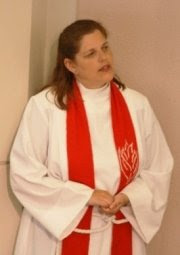In our Bible Challenge we are beginning our look at the major prophets. They are called major because they are long books in comparison to the other prophetic books in the Old Testament. However, both Isaiah & Jeremiah are certainly major theological work as well.
Remember that the word "prophecy" in Biblical literature doesn't necessarily refer to foretelling the future, but about calling the people of Israel, or the king, or the religious leaders or all three to repent and return to the ways of God.
This post is about the book of Isaiah.
Isaiah is actually not one book, but three. The three are set far apart both in time and in the events of the history of Israel.
First Isaiah (sometimes just called Isaiah) is chapters 1 - 39.
This was written in Jerusalem during the years from 742 to 701 BC. The key ideas of the book are that God, who is holy and just, demands that the people be righteous and that they trust in him. The people will be judged, but a remnant will be preserved and God will raise up a king from the line of David.
First Isaiah took place during the reigns of the kings Uzziah, Jotham, Ahaz and Hezekiah. Isaiah's call story places his call to be a prophet in the year of Uzziah's death. Uzziah's reign was a time of peace in Israel and because there was peace, it was a time when wealth increased for many of the people of Israel. That continued during the reign of Jotham, but when Ahaz came to the throne in 735, the Assyrian empire was gaining in power and more and more Assyria exerted power over Israel, even to the point of a temple being built to the Assyrian god in Jerusalem and the king participating in worship and sacrifice (possibly even including his own son) to that god.
The prophet of first Isaiah calls not only the king, but all the people to return to the ways of God, but fears that they will not and that they will be judged. He holds out hope that after the judgement of God, a remnant of the people will remain and that from that remnant God will raise up a king from the line of David who will rule not only Israel, but the world and will restore them to righteousness. Many of the writings about that king were believed, after the Babylonian captivity, to refer to king Cyrus of Persia and by the time of Jesus were being read to refer to the Messiah who would one day come to free the people of Israel.
Second Isaiah is chapters 40 - 55.
This was written in Babylon, during the captivity of the people of Israel. The book was written shortly before 539 BCE, or about 200 years after First Isaiah. The main concept is that God has forgiven the people and will restore them to their land. The ministry of the "servant of God" will extend the knowledge of God to all the nations.
Israel had been defeated by King Nebuchadrezzar of Babylon in the 570's BC. The walls of the city of Jerusalem and the temple were destroyed, all the leaders who survived, all the priests, anyone who could read or write and anyone with any skill was taken into captivity, leaving behind the poor and subsistence farmers in Israel. The author of Second Isaiah was among those taken into captivity.
After the death of King Nebuchadrezzar in 562, the Babylonian empire began to decline and in 539 BCE Babylon surrendered to King Cyrus of Persia. King Cyrus sponsored the return of the captives to Israel and sent Nehimiah to oversee the rebuilding of the temple and the walls of Jerusalem.
Second Isaiah holds out hope that the people of Israel will be returned to their land and that a servant of God will prepare the way for them and then spread the knowledge of God beyond the people of Israel. In it's own time the servant of God was taken to by Cyrus of Persia, but by the time of Jesus these verses had also come to be considered to refer to the coming Messiah.
Third Isaiah is chapters 59 - 66.
This is written in Jerusalem after 538 BC, after Cyrus of Persia had conquered Babylon. The main concept is that God vindicates the righteous and destroys the wicked.
Third Isaiah focuses a good deal on the universal love of God and the forgiveness and grace of God.
The Bible Challenge reading of Isaiah is:
March 3 - 9 - Isaiah 1 - 18
March 10 - 16 - Isaiah 19 - 40
March 17 - 23 - Isaiah 41 - 58
March 24 & 25 - Isaiah 59 - 66
Subscribe to:
Post Comments (Atom)

No comments:
Post a Comment